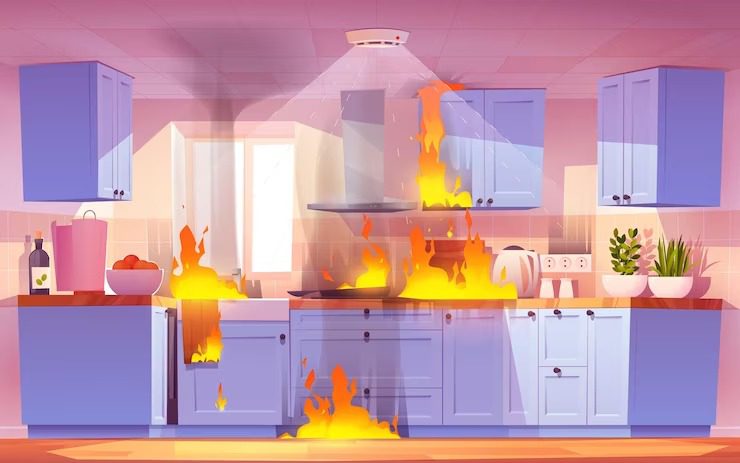Prevent Kitchen Fire: Eliminate the Risk

The kitchen is the heart of any home, where delicious meals are prepared and fond memories are made. But did you know that the kitchen is also one of the most common places for fires to start? Kitchen fires can be devastating, causing injuries, property damage, and even fatalities. That’s why it’s crucial to take steps to prevent kitchen fires and be prepared in case one does occur. In this article, we’ll explore the common causes and consequences of kitchen fires, as well as provide practical tips for keeping your kitchen safe and preventing fires. So whether you’re a seasoned chef or a novice cook, read on to learn how to eliminate the risk of kitchen fires and keep your family and home safe.
Read More: Best Way to Clean Oven Racks: Expert Tips and Techniques
Common Causes of Kitchen Fires
The kitchen is a hub of activity, but it’s also a place where accidents can happen. One of the most common accidents in the kitchen is a fire, which can start in a matter of seconds and quickly get out of control. There are many factors that can contribute to kitchen fires, and being aware of them can help you take steps to prevent them. Here are some of the most common causes of kitchen fires:
1. Cooking with high heat: Using high heat for cooking can cause oils and fats to ignite, leading to a fire.
2. Unattended cooking: Leaving food on the stove or in the oven unattended can lead to a fire, especially if the food is left for too long.
3. Grease buildup: Grease and oil can build up on stovetops, ovens, and other cooking surfaces, creating a fire hazard.
4. Electrical appliances: Faulty or damaged electrical appliances, such as toasters, microwaves, and coffee makers, can spark a fire.
5. Combustible materials near the stove: Materials like paper towels, oven mitts, and wooden utensils can easily catch fire if they are too close to the stove.
By being aware of these common causes of kitchen fires, you can take steps to prevent them and keep your kitchen safe.
Tips for Preventing Kitchen Fires
✅Stay in the Kitchen While Cooking
Staying in the kitchen while cooking is critical. Leaving cooking food or appliances unattended can allow small grease fires or overheating to accelerate into uncontrollable blazes in seconds. Remaining vigilant and present at all times while cooking is key to early fire detection and response.
✅Use a Timer to Keep Track of Cooking Times
Using a timer to actively monitor cooking times is an easy precaution that helps avoid overcooked or burnt food that could ignite and start a fire. Kitchen timers allow cooks to track multiple dishes at once and maintain close supervision over the cooking process even when stepping away briefly. Timers are an essential tool for fire prevention in the kitchen.
✅Keep Flammable Items Away From the Stove
Stowing all flammable items including dish towels, cleaning products, food packaging, and pot holders well away from the stove, oven and any open flames is important. Keeping flammables at a safe distance from heat sources removes fuel and helps ensure fires cannot start or spread easily, even if grease or food particles ignite. Eliminating flammables from the cooking area is a simple way to improve kitchen fire safety.
✅Clean Grease Buildup Regularly
Regular cleaning of grease and splatters from the stovetop, oven, range hood and surrounding surfaces reduces grease fire hazards significantly. Built-up grease deposits are the leading cause of kitchen fires, so frequent cleaning and degreasing of appliances and the surrounding area helps remove this major fire risk. Staying on top of grease buildup removal is one of the best ways to avoid kitchen fires.
✅Check Electrical Appliances for Damage or Frayed Cords
Inspecting small electrical appliances and their cords regularly and repairing or replacing any with damage prevents electrical fires. Frayed or cracked cords and damages to appliances themselves can spark electrical fires, so checking items like toasters, blenders, mixers and kettles often and fixing or replacing them when needed is important for kitchen safety.
✅Install A Smoke Detector In The Kitchen
Properly installed and functioning smoke detectors in the kitchen can alert to smoke or fire in the earliest stages, allowing rapid response before the blaze grows out of control. However, smoke detectors must be tested regularly to ensure they are operational and batteries must be changed according to the manufacturer’s recommendations for maximum effectiveness. Working smoke detectors double as an early warning system and a way to limit damage from kitchen fires.
What to Do in Case of a Kitchen Fire?
Despite your best efforts to prevent kitchen fires, accidents can still happen. Knowing what to do in case of a fire can help you stay calm and take the appropriate actions to protect yourself and your home. Here are some steps to follow in case of a kitchen fire:
➤Never try to put out a grease fire with water: If a grease fire occurs, never try to put it out with water. Water can cause the flames to spread and make the fire worse. Instead, turn off the heat source if it’s safe to do so, and smother the flames with a lid or baking soda.
➤Smother a small fire with a lid or baking soda: If you have a small fire in the kitchen, use a lid or baking soda to smother the flames. Cover the pan or pot with a lid to cut off the oxygen supply and smother the flames. If you don’t have a lid, you can use baking soda to extinguish the fire.
➤Use a fire extinguisher for larger fires: If the fire is too large to smother with a lid or baking soda, use a fire extinguisher. Make sure to keep a fire extinguisher in an easily accessible location in the kitchen and know how to use it before a fire occurs.
➤If the fire is out of control, evacuate the house and call 911: If the fire is out of control or spreading quickly, evacuate the house immediately and call 911. Make sure to close the doors behind you to help contain the fire and prevent it from spreading further.
FAQs
Q. What is the best fire protection for kitchens?
The best fire protection for kitchens is a combination of fire suppression systems, such as automatic sprinklers or fire extinguishing systems specifically designed for kitchen fires, along with proper fire safety practices.
Q. What is the best way to prevent a fire?
The best way to prevent a fire is to practice good fire safety habits, such as keeping flammable materials away from heat sources, regularly inspecting and maintaining electrical equipment, using caution when cooking, and having working smoke detectors installed throughout your home or establishment.
Q. How do you treat a kitchen fire?
If a kitchen fire occurs, it is important to remember the acronym “PASS”:
– Pull the pin on the fire extinguisher.
– Aim the nozzle at the base of the fire.
– Squeeze the handle to release the extinguishing agent.
– Sweep the nozzle from side to side while aiming at the base of the fire until it is extinguished. If the fire is too large to handle, evacuate the area immediately and call emergency services.
Q. What is the most common cause of kitchen fires?
The most common cause of kitchen fires is unattended cooking. Leaving cooking appliances, such as stoves or ovens, unattended can lead to overheating, oil or grease fires, or other accidents that can quickly escalate into a fire.
Q. What is the most common fire protection?
The most common fire protection measures include fire alarms, fire extinguishers, and fire sprinkler systems. These are widely used in residential, commercial, and industrial settings to detect and suppress fires.
Q. Which extinguisher is used for kitchen fire?
For kitchen fires involving cooking oils or fats, a Class K fire extinguisher is recommended. Class K extinguishers are specifically designed to handle high-temperature fires and are effective in suppressing kitchen fires.
7. What are the 5 rules for preventing fire?
Here are five important rules for preventing fires:
– Never leave cooking unattended.
– Keep flammable materials away from heat sources.
– Avoid overloading electrical outlets and use caution with electrical appliances.
– Install and maintain smoke detectors throughout your home or establishment.
– Have a fire escape plan and practice it regularly.
8. What are the 10 fire safety tips?
Here are ten fire safety tips to keep in mind:
- Install smoke detectors on every level of your home or establishment.
- Test smoke detectors regularly and replace batteries as needed.
- Keep flammable materials away from heat sources.
- Practice safe cooking habits and never leave cooking unattended.
- Avoid overloading electrical outlets and use caution with electrical appliances.
- Have a fire escape plan and practice it with your family or colleagues.
- Keep a fire extinguisher in an easily accessible location.
- Regularly inspect and maintain electrical equipment.
- Avoid smoking indoors and properly dispose of cigarette butts.
- Educate yourself and others on fire safety measures and procedures.
9. What are the 4 main principles of fire prevention?
The four main principles of fire prevention are:
Education: Learn about fire safety measures and educate others.
Detection: Install and maintain smoke detectors to detect fires early.
Suppression: Have fire extinguishers or fire suppression systems in place to suppress fires.
Evacuation: Have a fire escape plan and practice it regularly to ensure a safe evacuation in case of a fire.
Conclusion
Preventing kitchen fires is crucial for keeping your family and home safe. By being aware of the common causes of kitchen fires and taking steps to prevent them, you can significantly reduce the risk of a fire occurring in your kitchen. Additionally, it’s important to be prepared in case of a fire by knowing what to do and having the necessary tools on hand, such as a fire extinguisher and smoke detector. Remember to always stay vigilant in the kitchen, stay in the kitchen while cooking, keep flammable items away from the stove, clean up grease buildup regularly, check electrical appliances for damage, and install a smoke detector in the kitchen. With these tips and precautions, you can enjoy cooking in your kitchen while keeping your family and home safe.




